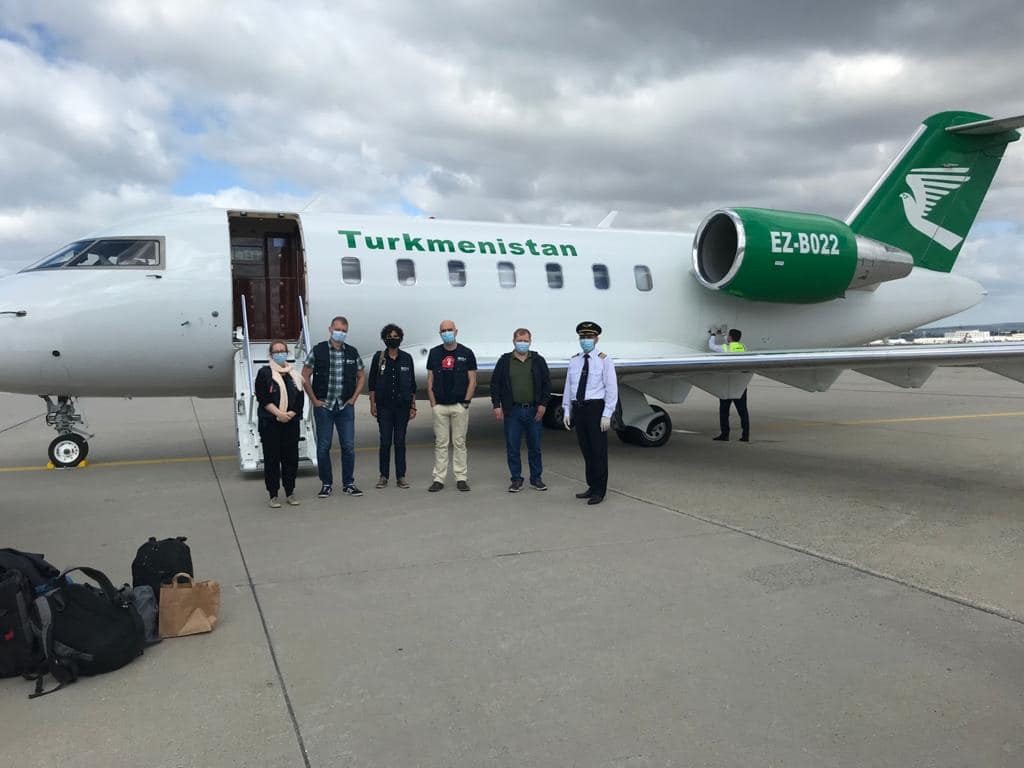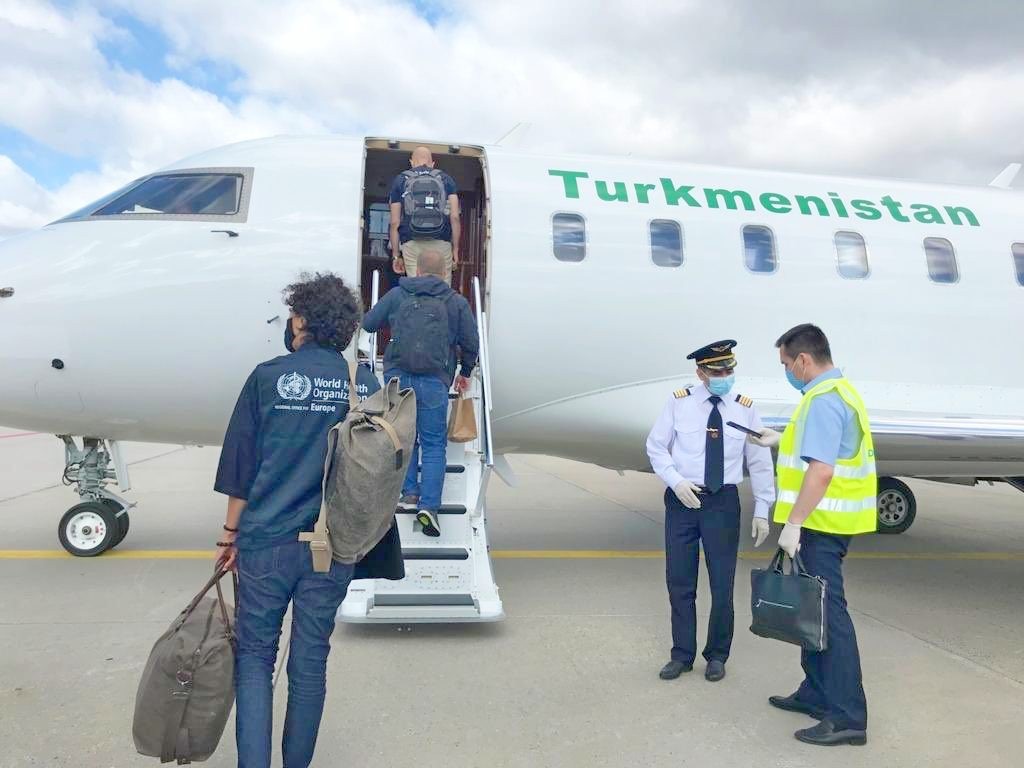A mission of WHO (World Health Organization) arrived on Monday, 6 July 2020, has arrived for consultations with Turkmenistan on Covid-19 preparedness and response and related matters.
The 5-member delegation, led by Dr. Catherine Smallwood, landed at the Turkmenabat airport, the only international airport of Turkmenistan currently open for international flights.
The mission will stay in Turkmenistan for 10 days and during this period they will visit healthcare establishments, public health centres, labs, and other institutions at the national, provincial, and district level. They will look at preventive measures at entry-exit points around the population centres.
The WHO delegation will have meetings with the officials and experts from the healthcare sector of Turkmenistan.
The delegation was flown in from Frankfurt by the Turkmenistan Airlines on its Bombardier Challenger 605 aircraft.
Before the start of the visit Dr. Catherine Smallwood answered some questions that had been provided to her earlier by the Turkmen media:
The WHO COVID-19 mission is arriving to Turkmenistan next week. What is the purpose of this mission, how many WHO experts are part of it and how long will they be working in Turkmenistan?
The WHO mission is scheduled to arrive in Turkmenistan on 6 July to work with national and local authorities on aspects of COVID-19 preparedness and response. These areas include coordination and control systems at the national level, epidemiology and surveillance, laboratory services, patient management, infection prevention and control and risk communication.
During 10-day deployment, the mission team aims to meet high-level officials and public health experts in the relevant areas to work together to assess the risks and develop the response mechanisms that would be required to tackle COVID-19. Experts will visit healthcare facilities, public health centers, laboratories and other facilities at the national, regional, and city levels and points of entries.
The mission is part of the tailored support WHO is providing to its countries in the European Region. During the past months, WHO sent around 70 missions to countries in the Region to assist with their responses to COVID-19 outbreaks, and we very much welcome this new opportunity to work closely with Turkmenistan in these unprecedented times.
WHO mission has been postponed several times. Can you explain why?
Travel restrictions during the COVID-19 pandemic have made travelling across Europe very challenging. We and the government of Turkmenistan have continued discussing transport options to enable a technical mission to reach the country and this is now happening on 6 July with the support of the Government of Turkmenistan.
How do you consider WHO relationship with the Government of Turkmenistan? How do you work with the Ministry of Health on COVID-19?
WHO has had a long-standing relationship with the Government of Turkmenistan and its Ministry of Health. The WHO Country Office in Turkmenistan was established in November 1995 in Ashgabat to assist the Government in developing its health policy, health system and public health programmes. The Office is the focal point for WHO activities in Turkmenistan. The planned mission to the country will focus on preparing for and getting ready to manage COVID-19’s emergence and spread. Together with the Health Ministry and with the support of partners and donors, we have been working on several projects such as trainings for healthcare workers, development of communication materials and many others.
Turkmenistan has not reported COVID-19 cases. The country has been keeping the virus at bay and the COVID-19 control approach of the Turkmen authorities is working well. As WHO expert, what is your opinion of the situation in the country?
Turkmenistan has established a national multi-sectoral COVID-19 task force; approving a COVID-19 Preparedness and Response Plan; and developing COVID-19 guidelines for prevention, diagnosis and treatment. Reorganization of facilities and staff at all levels of the health system is a critical step the government has been taking: this includes repurposing facilities and training healthcare workers. We are looking forward to learning more during our visit.
We are ready to support Turkmenistan to identify the most effective measures to stop COVID-19 spread and look forward to having our team on the ground to work hand-in-hand with national and local authorities to protect people from COVID-19 in the country.
The Government of Turkmenistan together with the UN Resident Coordinator developed the National Plan for Preparing and Responding to the Coronavirus Infection. WHO was part of this process. Can you tell us more about the Plan, is it in line with WHO standards?
Indeed, WHO took the lead in helping the country develop its COVID-19 Preparedness and Response Plan. It has been developed according to the WHO standards. The goal of the plan is to prevent the importation of the infection into the country and, if it happens, interrupt further transmission and mitigate the social and economic consequences of the outbreak. In the preparation phase, the Plan should help determine the areas and measures required to strengthen national capacities, as well as help the Government, UN agencies and other international partners to identify the areas that need additional resources and funding.
WHO is also supporting Turkmenistan dealing with long term impact of pandemic. /// nCa, 7 July 2020

